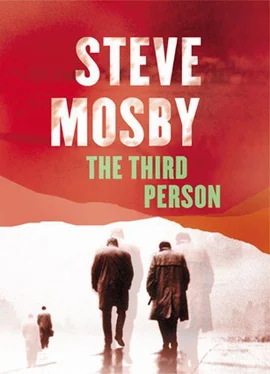Steve Mosby - The Third Person
Здесь есть возможность читать онлайн «Steve Mosby - The Third Person» весь текст электронной книги совершенно бесплатно (целиком полную версию без сокращений). В некоторых случаях можно слушать аудио, скачать через торрент в формате fb2 и присутствует краткое содержание. Жанр: Триллер, на английском языке. Описание произведения, (предисловие) а так же отзывы посетителей доступны на портале библиотеки ЛибКат.
- Название:The Third Person
- Автор:
- Жанр:
- Год:неизвестен
- ISBN:нет данных
- Рейтинг книги:3 / 5. Голосов: 1
-
Избранное:Добавить в избранное
- Отзывы:
-
Ваша оценка:
- 60
- 1
- 2
- 3
- 4
- 5
The Third Person: краткое содержание, описание и аннотация
Предлагаем к чтению аннотацию, описание, краткое содержание или предисловие (зависит от того, что написал сам автор книги «The Third Person»). Если вы не нашли необходимую информацию о книге — напишите в комментариях, мы постараемся отыскать её.
The Third Person — читать онлайн бесплатно полную книгу (весь текст) целиком
Ниже представлен текст книги, разбитый по страницам. Система сохранения места последней прочитанной страницы, позволяет с удобством читать онлайн бесплатно книгу «The Third Person», без необходимости каждый раз заново искать на чём Вы остановились. Поставьте закладку, и сможете в любой момент перейти на страницу, на которой закончили чтение.
Интервал:
Закладка:
I’m not judging you .
‘And it bothers me that the girl didn’t fight back,’ Amy told me once. She wasn’t looking at me: she was just staring into the distance between her toes, moving them slightly beneath the duvet. We always had these conversations in the middle of the night, with an emergency lamp flicked on to wipe away the nightmares.
She said, ‘I think she should have done, maybe.’
‘I don’t think she should.’
‘You don’t?’
‘No.’
What an impossible question. I just said what I thought might help.
‘I think maybe she should have, though.’ Amy frowned, intent on her main character and her motivations. ‘It could all have turned out very differently. Because she didn’t fight at all. Maybe she could have got away if she did.’
‘You could have got hurt more than you did.’
Amy ignored the slip. To be honest, there were times when I didn’t really need to be there.
‘I mean, she did tell him no. She told him all the way through: No!’
‘Exactly.’
‘But she didn’t fight him.’
I said, ‘She did the right thing.’
Amy actually looked at me then. Generally, she’d have stopped crying by now, and this occasion was no different.
‘Do you think so?’
‘Absolutely.’ I put my arm around her shoulders. Her body felt soft and fragile. ‘He was a big guy, wasn’t he? He could have hurt her very badly.’
She leaned against me.
‘This girl,’ I repeated, ‘she did the right thing.’
Amy told me that the girl thought long and hard, but in the end she decided not to press charges.
The End.
Except not.
Like all good storytellers, she knew the boy’s name; I asked her, and she told me. And like a good background researcher, I went looking. Do you know how to go looking for somebody? Neither did I back than. It certainly didn’t work out the way it does in the movies, because what I hit – time and time again – was this one fact: the University Halls of Residence were bound by the Data Protection Act. They wouldn’t even confirm whether the boy had ever lived there, never mind where he might have gone when he left.
Amy never knew I went looking. I could never have let her know either, because it would have felt like a betrayal: like I was hijacking her tragedy and trying to turn it into some drama of my own. People need to have ownership over the stories in their past, and it’s wrong to take them and try to make them yours. You don’t have that right. But I did it anyway. And then, with nothing to show for it but a growing sense of my own inadequacy, I stopped.
I threw that sense of inadequacy away, aware that it was an aimless, unfocused thing I shouldn’t keep. Amy did her best to forget, too. I sometimes wondered how she dealt with it; on one occasion I asked her, and this is what she told me:
I imagine I have a black box, she said. Except it’s big, so I guess it’s more like a chest or a trunk. I keep it in an attic. It’s a room I can see very, very clearly, although I don’t know where I get the image from. Maybe a film; I don’t know. It’s this wide attic room, with a slanted roof. There’s a skylight in the middle which lets in moonlight, and the only furniture is this black box. Whenever anything bad happens to me, I go up into the attic, open the lid and put whatever it is inside the box. Then I shut the box and forget about it .
She said that she’d been doing this ever since she was a child, and that the story of what happened to the girl at the party was just one more thing to pile inside. After a while, she hoped, she wouldn’t know the story off by heart anymore. After a while longer, she wouldn’t know it at all.
And for some time it seemed to be working. When we first met, it was quite common for the narratives of her dreams and the story to dovetail together, and it wasn’t the kind of story that you slept soundly through. I imagined her mind drifting upstairs to this imaginary attic and opening this imaginary trunk: the story would leap out at her and she’d wake herself up screaming. In the middle of the night, there’s no such thing as just a story. There’s no past tense. No third-person.
But there was probably a period of about a year when she stopped having nightmares altogether. The sex became easier: more relaxed. We hardly even thought about it. But it never went away entirely, and when it started to come back again I wasn’t as young as I used to be: not as able or willing to help. I don’t even want to think about some of the things I didn’t do, or some of the right words I didn’t say.
An example. You have a hundred dreams about people dying in your life, but you only remember the one where you woke up to the news that your mother died during the night. Some people base their whole world-view on it. Well, it’s the same with relationships. I don’t remember the thousand and one good nights I had with Amy, only the handful of bad that seem to define everything about us. That’s certainly how it was in the last few months, anyway, when we could barely speak to each other and all she did was surf black websites trying to understand what had happened. Trying to read between the lines.
The worst thing is that she seemed happier before she disappeared: it was a mystery to me back then, but I understand it now. She had her plan. Her investigation.
She seemed happier, and so I never saw it coming.
CHAPTER EIGHT
The cab took me to Uptown by the north loop. Once through the toll booth (I had to pay the five pounds access fee), it took about five minutes to reach the address on the business card, which turned out to be nominally above Peace of Mind Insurance: one of our direct competitors. Life is full of these little twists, isn’t it?
‘Do you want me to wait?’
I told the cabbie that I didn’t, and gave him slightly more money than the straight fare, which was slightly less than I had in my pocket. I peeled it off through the window, and he took it from me with a quick hand and drove away. He left me at the end of a long gravel drive leading up to a sprawling, two-storey mansion. Between me and the front door was a black metal gate with an intercom beside it. Above all of this was a video camera on a pole, like some kind of severed head on a pike.
I wandered over, my feet crunching across the wet gravel. It was very quiet here, and I guess I could understand the appeal – especially as the sky now seemed to have settled down to an over-reaching blue, smeared with still grey cloud. There was a slight breeze, but it was far from unpleasant. It was like being on a cliff-top.
I held down the red button for a full ten seconds, and then stepped back in time to see the video camera whirring around to focus on me. Nothing happened for a moment, and then the gate jerked into life. A bland voice crackled out of the intercom.
‘Approach the house.’
I made my way up the drive. The gate jittered back across behind me like an old lady crossing the street, and buzzed in celebration when it finally re-established contact. The front door of the house had opened up, and a figure dressed in a black suit – incongruous in the mild sunshine – stepped out onto the spread of the porch and waited for me, his hands clasped almost protectively in front of his groin. I could see his half-bald head gleaming from here, and recognised him as the man with the gun from my house the night before.
‘Mr Klein,’ he said, shaking my hand when I reached him, and looking me over as though I was a series of targets for him to punch.
I returned both compliments. Mentally, I was striking him in the throat, kicking him on the inside of one knee, slamming a punch into his solar plexus.
Читать дальшеИнтервал:
Закладка:
Похожие книги на «The Third Person»
Представляем Вашему вниманию похожие книги на «The Third Person» списком для выбора. Мы отобрали схожую по названию и смыслу литературу в надежде предоставить читателям больше вариантов отыскать новые, интересные, ещё непрочитанные произведения.
Обсуждение, отзывы о книге «The Third Person» и просто собственные мнения читателей. Оставьте ваши комментарии, напишите, что Вы думаете о произведении, его смысле или главных героях. Укажите что конкретно понравилось, а что нет, и почему Вы так считаете.












